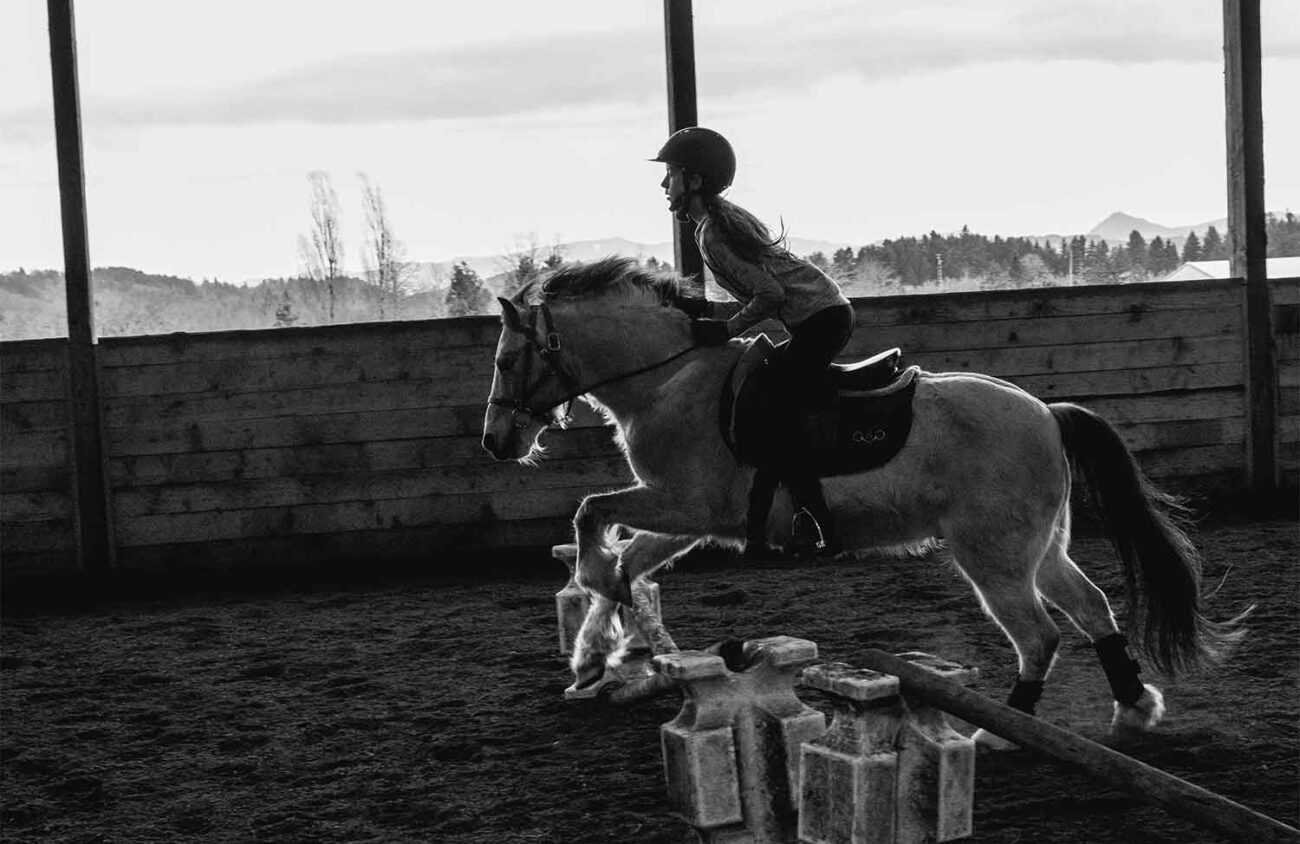Solid Strides is a nonprofit program in south Eugene with the overarching goal of getting kids access to horses, particularly kids in historically underserved populations. This will be the program’s third summer hosting a summer camp series, according to Executive Director Katie Ebbage.
Kids K-12 are welcome, with each age group attending the summer camp for four days. During the camps, students learn about topics like horses’ lifestyle and nutrition, parts of the horse and receive in-the-saddle training when appropriate. Their first year, Solid Strides camps were free. Last year, they were $10 per student. This year, Ebbage says the camps will cost $300 per student, discounted 50 percent for kids on free and reduced lunch.
“It feels really inaccessible to the kids who don’t have resources,” she says, “which is kind of antithetical to our whole mission.”
Summer programs can help working families with child care and give students without resources access to activities that might otherwise be out of their reach.
For the last two years, the Oregon Legislature has allocated funding to summer learning programs. In 2021, $200 million was provided to schools and education service districts (ESDs), and $40 million to community-based organizations, like Solid Strides, that provide summer programs. In 2022, $100 million was allocated to schools and ESDs, and $50 million to community-based organizations. Funding has not yet been allocated to summer learning programs for 2023.
“Despite the broad support for investments in summer learning and enrichment over the past two years and our advocacy for this year, it doesn’t appear there is the needed legislative support to give you that certainty and the time you need to plan summer programming,” Director of Department of Education Colt Gill writes in a letter to community partners.
Now, community-based organizations, grants programs and educational collaborations are scrambling as they figure out how to move forward.
Last year, state funds were administered to community-based organizations through the Oregon Community Summer Grants (OCSG) initiative by Oregon Association of Education Service Districts (OAESD). According to an OCSG report, the grants allowed community-based organizations to host 6,133 individual summer programming opportunities and serve almost 240,000 kids.
OAESD and OregonASK, a collaboration that publishes research and reporting about afterschool and summer learning, are continuing to advocate for summer funding and keeping community-based organizations in the loop on where things stand in the state Legislature.
Beth Unverzagt, executive director of OregonASK, says that this year’s lack of funding for summer programs is in part about priorities in the Legislature.
“There’s just a lack of understanding around the needs of working families, which has become really apparent,” Unverzagt says. “We were a child care desert before, but now it’s even worse.”
According to a survey of last year’s OSCG recipients, without funding this year, 85 percent of the responding community-based organizations will serve fewer kids than last year, 73 percent will offer fewer summer programs than last year and 20 percent will not be able to offer summer programming this year at all.
Even if some kind of funding does come through, Ebbage says that at this point, she won’t see it until well into the summer. No matter what happens now, this summer’s programming, and many kids’ ability to participate in it, has been impacted.
“It’s really difficult to make any decisions and do any planning. And then, in addition, how many programs just don’t run?” Ebbage says. “Or how many kids who are maybe under-resourced or have some barriers just don’t get to participate in summer programs?”
This story was developed as part of the Catalyst Journalism Project at the University Of Oregon School of Journalism and Communication. To learn more visit CatalystJournalism.uoregon.edu.
A Note From the Publisher

Dear Readers,
The last two years have been some of the hardest in Eugene Weekly’s 43 years. There were moments when keeping the paper alive felt uncertain. And yet, here we are — still publishing, still investigating, still showing up every week.
That’s because of you!
Not just because of financial support (though that matters enormously), but because of the emails, notes, conversations, encouragement and ideas you shared along the way. You reminded us why this paper exists and who it’s for.
Listening to readers has always been at the heart of Eugene Weekly. This year, that meant launching our popular weekly Activist Alert column, after many of you told us there was no single, reliable place to find information about rallies, meetings and ways to get involved. You asked. We responded.
We’ve also continued to deepen the coverage that sets Eugene Weekly apart, including our in-depth reporting on local real estate development through Bricks & Mortar — digging into what’s being built, who’s behind it and how those decisions shape our community.
And, of course, we’ve continued to bring you the stories and features many of you depend on: investigations and local government reporting, arts and culture coverage, sudoku and crossword puzzles, Savage Love, and our extensive community events calendar. We feature award-winning stories by University of Oregon student reporters getting real world journalism experience. All free. In print and online.
None of this happens by accident. It happens because readers step up and say: this matters.
As we head into a new year, please consider supporting Eugene Weekly if you’re able. Every dollar helps keep us digging, questioning, celebrating — and yes, occasionally annoying exactly the right people. We consider that a public service.
Thank you for standing with us!

Publisher
Eugene Weekly
P.S. If you’d like to talk about supporting EW, I’d love to hear from you!
jody@eugeneweekly.com
(541) 484-0519
